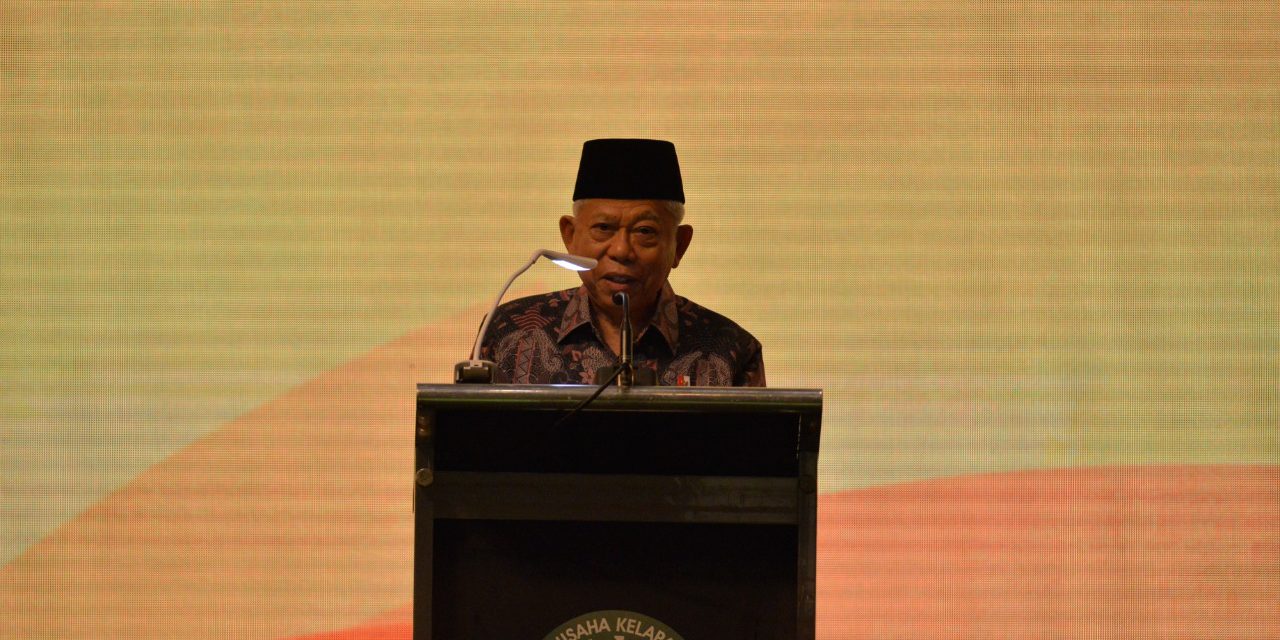Nusa Dua. Indonesia is taking steps to increase competitiveness and productivity in its palm oil industry, especially through boosting domestic consumption.
Palm oil is the country’s largest export commodity, earning it more than Rp 27 trillion ($1.9 billion) in state revenue. Indonesia currently exports about 70 percent of its palm oil, also making it the world’s largest palm oil exporter.
“Through this forum, I encourage palm oil development to focus more on land productivity and competitiveness,” Vice President Ma’ruf Amin said in his keynote address at the start of the 15th Indonesian Palm Oil Conference in Nusa Dua, Bali, on Thursday.
The conference, presented by the Indonesian Palm Oil Association (Gapki), and attended by various national and international experts and industry representatives, is the world’s largest annual palm oil industry event. The theme of this year’s conference is “Managing Market, Enhancing Competitiveness.”
Ma’ruf highlighted four points in Indonesia’s policy on improving its palm oil industry.
Replanting Program
The vice president said a replanting program launched in October 2017 was crucial to increased palm oil production.
“I asked the agriculture minister to assist farmers with the replanting program, financed by the Palm Oil Plantation Fund Management Agency [BPDPKS] and to remove all administration obstacles,” Ma’ruf said.
The BPDPKS provides farmers and smallholders with Rp 25 million per hectare to replant their farms with oil palms of higher quality.
Musdhalifah Machmud, deputy for food and agriculture coordination at the Coordinating Ministry of Economic Affairs, said the government was also assisting farmers in the administration process.
“This initiative is specially for independent farmers, and we are assisting them to succeed. We have already completed 50,000 hectares of this year’s 180,000-hectare target,” Musdhalifah told the media on Thursday.
According to Kasdi Subagyono, director general of plantations at the Ministry of Agriculture, the challenge is data collection, especially from independent farmers and smallholders.
“The total land that has potential to be replanted is 2,4 million hectares. However, 40 percent of our producers are smallholders, and we having problems with our database,” Kasdi said during a panel discussion.
Certification
Ma’ruf also expects Indonesian Sustainable Palm Oil (ISPO) certification to counter discrimination and campaigns against the country’s palm oil exports.
“We must resist all systematic efforts in the negative campaign against Indonesian palm oil by improving ISPO certification,” he said.
Musdalifah said a revision of the ISPO certification criteria is currently awaiting President Joko “Jokowi” Widodo’s approval.
“The existing ISPO is already good, but the current dynamic on the environmental impact is getting wider. Through the presidential regulation, we will provide documentary proof that palm oil is sustainable,” she said.
Downstreaming
Ma’ruf said industries using palm oil as raw material should become more developed.
“Such as the biofuel industry and the food industry; downstream is the answer when palm oil output is abundant,” he said.
Erliza Hambali, a professor at the Bogor Agricultural University (IPB), said Indonesia has huge potential to add value to its palm oil.
“Our crude palm oil production is 42 million tons. The mining industry takes up around 12 million tons, a full B30 policy would need 12 million tons and 5 million tons for other products. We still have 13 million tons left, and we can produce various chemical products from this,” Erliza said, referring to the government’s mandatory 30 percent biodiesel policy, which will become effective on Jan. 1 next year.
Biofuel
Ma’ruf said the government would increase the percentage of biodiesel in the national fuel mix, which would increase domestic palm oil consumption.
“The 20 percent biodiesel [B20] policy has consumed more than 4 million tons of palm oil and we project it to reach 6.4 million tons by the end of this year. The 30 percent biodiesel policy will start in January 2020 and will consume an additional 3 million tons of palm oil for the entire year,” the vice president said.
He said Indonesia would further boost domestic crude palm oil consumption by using it in power plants and as aviation fuel, among others.
According to data compiled by the Ministry of Energy and Mineral Resources, biodiesel uptake under the B20 program had reached about 68 percent of this year’s 6.6 million kiloliter allocation by September.
The energy ministry has set an allocation of 9.59 kiloliters for next year, to support the B30 policy.
Source: Jakarta Globe










